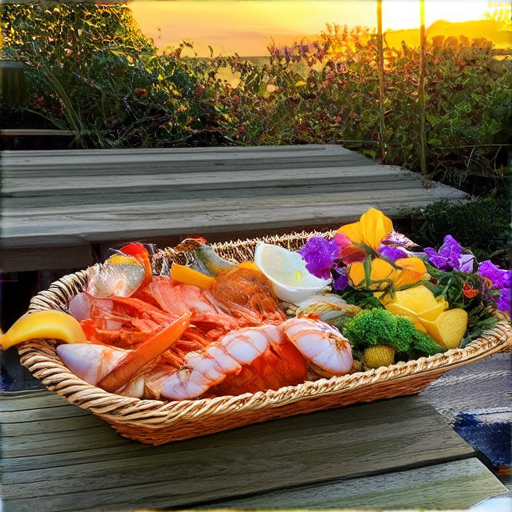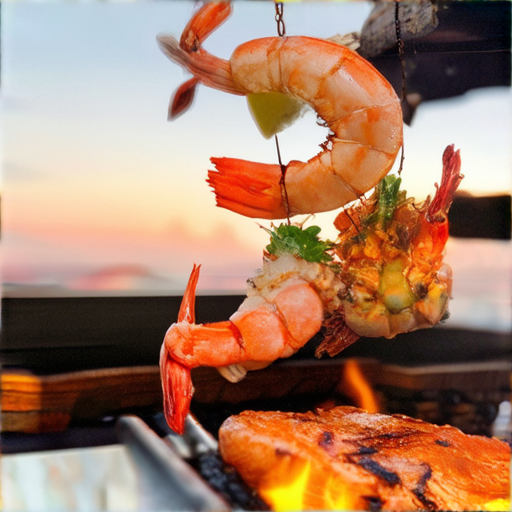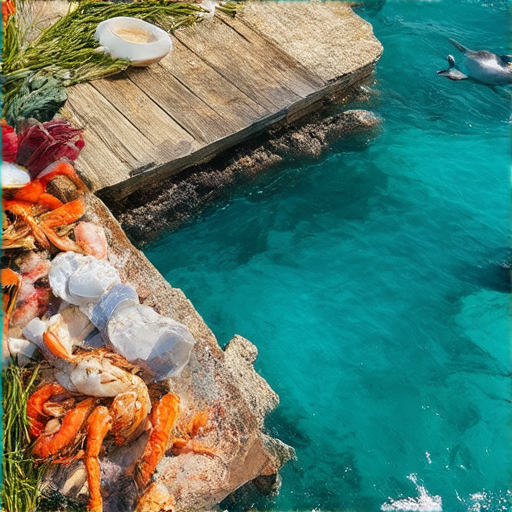Indulge in the flavors of the Mediterranean with our comprehensive guide to grilled seafood ideas, perfect for creating a delectable seafood platter that will impress your friends and family. From choosing the right seafood to mastering various grilling techniques, we’ll cover everything you need to know to elevate your seafood game. Discover the best types of fish for grilling, how to prepare frozen seafood, and expert tips on adding flavor to your grilled seafood dishes. Whether you’re looking for simple and easy recipes or want to impress your guests with a special occasion dish, our article will provide you with the inspiration and guidance you need to create mouth-watering grilled seafood meals.
Discover the secrets to creating a delicious Mediterranean seafood platter, from choosing the right seafood to serving suggestions that will complement your grilled seafood perfectly.
Best Seafood Options for Grilling
When it comes to grilling seafood, several factors come into play, including the type of fish, its fat content, and cooking time.
- Firm-textured fish hold up well to high heat and can withstand the intense grilling process.
- Fish with a moderate fat content tend to retain moisture and flavor during grilling.
- Avoid delicate fish with low fat content, as they may become overcooked or dry.
Recommended Seafood Options for Grilling
The following seafood options are popular choices for grilling due to their firm texture and rich flavors:
- Salmon: Rich in omega-3 fatty acids, salmon has a meaty texture that pairs well with smoky flavors.
- Tuna: With its firm texture and rich flavor profile, tuna is an excellent choice for grilling.
- Swordfish: A mild-flavored fish with a firm texture, swordfish is ideal for grilling and can be paired with a variety of marinades.
- Halibut: A firm-fleshed fish with a slightly sweet flavor, halibut is perfect for grilling and can be served with a range of toppings.
- Mackerel: With its rich, oily flesh and firm texture, mackerel is an excellent choice for grilling and can be paired with bold flavors.
Tips for Grilling Seafood
To ensure perfectly grilled seafood, follow these tips:
- Preheat the grill to medium-high heat to sear the fish quickly and lock in juices.
- Use a thermometer to monitor internal temperatures and avoid overcooking.
- Marinate the fish in a mixture of olive oil, lemon juice, and herbs to enhance flavor and tenderize the flesh.
- Don’t overcrowd the grill, cook in batches if necessary to prevent steaming instead of searing.
Fish Popular for Grilling
When it comes to grilling fish, several species offer excellent options due to their firm texture and rich flavor.
- Halibut: Known for its meaty texture and high fat content, halibut is an ideal choice for grilling. Its firm flesh holds up well to high temperatures, making it perfect for those who prefer a crispy exterior and a tender interior.
- Monkfish: With its unique flavor profile and firm texture, monkfish is another popular option for grilling. Its slightly sweet taste pairs well with a variety of marinades and seasonings.
- Swordfish: A classic choice for grilling, swordfish boasts a firm texture and a rich, meaty flavor. Its high fat content helps keep it moist during cooking.
- Snapper: Snapper offers a delicate yet flavorful alternative to the above options. Its firm flesh holds up well to grilling, and its mild taste makes it suitable for a variety of marinades and seasonings.
For less robust fish, such as cod or tilapia, preparation is key to achieving a successful grilled dish. To prevent flaking and falling apart, try the following:
- Pat dry the fish thoroughly before marinating to remove excess moisture.
- Use a gentle touch when handling the fish to avoid breaking or tearing the flesh.
- Grill over medium-low heat to prevent the fish from cooking too quickly and becoming tough.
In addition to choosing the right fish, consider the following tips to elevate your grilled fish experience:
- Marinate the fish in a mixture of olive oil, lemon juice, and herbs to enhance flavor and moisture.
- Top the fish with a flavorful sauce or seasoning blend after grilling for added flavor and visual appeal.
- Serve the grilled fish with a side of roasted vegetables or a fresh salad to round out the meal.

Grilling Fish Without Oil: A Comprehensive Guide
When it comes to grilling fish, one common debate revolves around whether to apply oil to the fish before grilling. While some swear by this technique, others claim it’s unnecessary. In this article, we’ll delve into the world of grilling fish without oil, exploring its benefits, drawbacks, and tips for achieving perfect results.
Why You Shouldn’t Put Oil on Fish Before Grilling
- Flavor Profile: Applying oil to the fish can overpower its natural flavor, masking the delicate taste of the seafood.
- Texture Issues: Excess oil can lead to a greasy texture, making the fish unappealing to eat.
- Health Concerns: Consuming excessive amounts of oil can increase calorie intake and contribute to weight gain.
Benefits of Grilling Fish Without Oil
- Preserves Natural Flavor: By avoiding oil, you allow the fish to retain its natural flavors and aromas.
- Reduces Calorie Intake: Skipping oil means fewer calories, making it an ideal option for health-conscious individuals.
- Improved Texture: Grilled fish without oil tends to have a crispy exterior and flaky interior, enhancing overall texture.
Alternative Methods for Preventing Stickiness
- Pat Dry the Fish: Gently pat the fish dry with paper towels before grilling to remove excess moisture.
- Use a Non-Stick Grill Mat: Invest in a non-stick grill mat to prevent sticking and make cleanup easier.
- Brush the Grill Grates: Use a brush to clean the grill grates before adding the fish, removing any debris or residue.
Tips for Perfectly Grilled Fish
- Preheat the Grill: Preheat the grill to medium-high heat to ensure even cooking.
- Don’t Overcrowd: Cook fish in batches if necessary, to prevent overcrowding and ensure even cooking.
- Flip with Care: Flip the fish gently to avoid breaking the flesh or causing it to fall apart.

Grilling Frozen Seafood: Safety and Tips
Frozen seafood can be safely grilled without thawing, preserving its texture and flavor.
Understanding Freezing and Cooking
- Freezing seafood helps preserve its natural moisture and nutrients.
- Cooking from frozen prevents bacterial growth, reducing the risk of foodborne illness.
Effective Grilling Methods
- Baking: Preheat oven to 400°F (200°C). Place frozen seafood on a baking sheet lined with parchment paper, leaving space between each piece. Bake for 8-12 minutes or until cooked through.
- Grilling: Preheat grill to medium-high heat. Place frozen seafood on a greased grill grate, leaving space between each piece. Close lid and cook for 4-6 minutes per side or until cooked through.
- Pan-searing: Heat a skillet over medium-high heat. Add oil and place frozen seafood in the skillet. Cook for 3-5 minutes per side or until cooked through.
Additional Tips
- Pat dry frozen seafood before grilling to enhance browning and crispiness.
- Use a meat thermometer to ensure seafood reaches a minimum internal temperature of 145°F (63°C).
- Don’t overcrowd the grill or pan, as this can lead to uneven cooking and reduced quality.
Defrosting Frozen Seafood Before Cooking: A Comprehensive Guide
When it comes to cooking frozen seafood, one common debate revolves around whether to defrost it first or cook it straight from the freezer.
Understanding the Risks of Cooking Frozen Seafood
- Cooking frozen seafood can lead to uneven cooking, resulting in overcooked exterior and undercooked interior.
- This can pose food safety risks, particularly if the seafood is not cooked to a safe internal temperature.
Benefits of Defrosting Frozen Seafood
- Defrosting allows for even cooking, reducing the risk of overcooking or undercooking.
- It enables you to inspect the seafood for any visible signs of spoilage or damage.
Safe Defrosting Methods
- Refrigerator thawing: Place the seafood in a leak-proof bag on the middle or bottom shelf of the refrigerator, allowing air to circulate around it.
- Cold water thawing: Submerge the seafood in a sealed bag in cold water, changing the water every 30 minutes until thawed.
Best Practices for Cooking Defrosted Seafood
- Pat dry the seafood with paper towels before cooking to remove excess moisture.
- Use a thermometer to ensure the seafood reaches a safe internal temperature, depending on the type of seafood.
Exceptions and Precautions
- Some types of seafood, like shrimp and scallops, can be safely cooked from frozen without defrosting.
- Always check the packaging or product page for specific cooking instructions, as some products may require special handling.

Grilling Frozen vs Thawed Shrimp: What’s the Better Option?
When it comes to grilling shrimp, one of the most common debates revolves around whether to use frozen or thawed shrimp.
Grilling Frozen Shrimp: A High-Risk Approach
- Grilling frozen shrimp can lead to uneven cooking and a tough exterior, making it challenging to achieve a tender and juicy texture.
- The risk of undercooking the interior increases when using frozen shrimp, which can result in foodborne illnesses.
Thawed Shrimp: The Preferred Choice
- Thawing shrimp before grilling allows for even cooking and a more consistent texture throughout.
- Peeled and deveined shrimp cook faster than whole shrimp, reducing the risk of overcooking.
- Marinating thawed shrimp enhances flavor and helps to tenderize the meat, resulting in a more enjoyable grilling experience.
Tips for Grilling Thawed Shrimp
- Pat dry the shrimp with paper towels before grilling to remove excess moisture and promote browning.
- Use a medium-high heat to sear the shrimp quickly, then reduce the heat to finish cooking them through.
- Don’t overcrowd the grill, as this can lower the temperature and affect cooking time.
Conclusion
In conclusion, while it is technically possible to grill frozen shrimp, the risks associated with uneven cooking and potential food safety issues make thawed shrimp the preferred choice. By following these tips and techniques, you can achieve perfectly cooked and deliciously flavored shrimp every time.

0 Comments